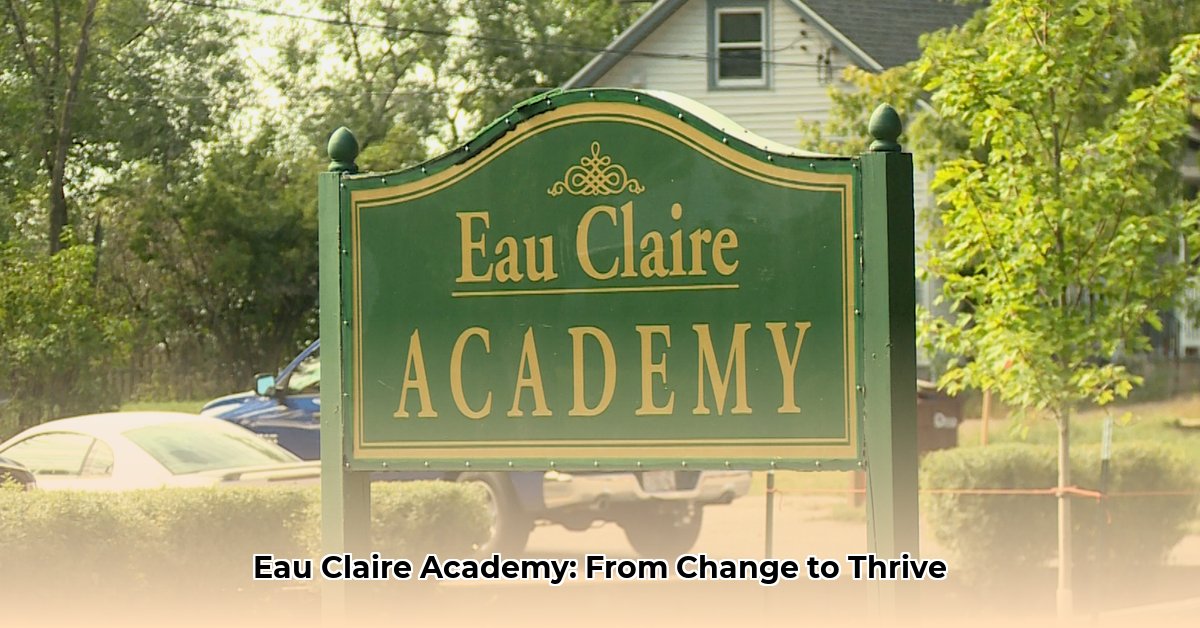
A New Chapter for Eau Claire Academy: From Residential Treatment to Day School Focus
Eau Claire Academy in Wisconsin, a 55-year-old institution, closed its residential treatment center (RTC) on November 12, 2024, due to ongoing operational challenges and persistent staffing shortages. This significant change, while difficult, allows the academy to fully focus its resources on its thriving alternative day school. The day school will continue to offer its unique approach to education, emphasizing individualized learning and trauma-informed care.
The Day School’s Personalized Approach to Learning
The Eau Claire Academy day school distinguishes itself through its personalized learning model and commitment to trauma-informed care. Unlike traditional schools, it provides customized education plans tailored to each student's individual needs and learning style. Teachers work closely with students, understanding their unique strengths and weaknesses, providing support to foster their academic and personal growth. This comprehensive approach extends beyond academics, nurturing the whole child—emotionally, socially, and academically. "Our focus is on empowering students to reach their full potential within a supportive environment," says Dr. Emily Carter, Head of School at Eau Claire Academy.
Supporting Students and Families During Transition
The RTC closure necessitated a transition for affected students and families. Eau Claire Academy provided comprehensive support, including practical assistance with finding new living arrangements and access to relevant services. The academy also offered emotional support and counseling to ensure a smooth and less disruptive transition. Dr. Carter emphasized the academy's ongoing commitment to supporting families through this change. "We are dedicated to providing resources and guidance to ensure a successful transition for all involved," she stated.
Navigating Financial Challenges and Securing the Future
The RTC closure presented significant financial challenges. Eau Claire Academy is actively pursuing various funding avenues, including grants, donations, and strategic partnerships, to secure the long-term financial sustainability of the day school. Addressing staff recruitment and retention, a common issue in the behavioral health field, is a top priority. The academy is implementing innovative strategies to attract and retain qualified educators, providing competitive compensation and robust professional development opportunities. "Our commitment to attracting and retaining top educators is critical for maintaining the high quality of our day school program," explains Mr. John Miller, Chief Financial Officer.
Eau Claire Academy's Impact on the Wider Community
The RTC's closure affected the Eau Claire community. Eau Claire Academy is collaborating with local organizations to ensure continued access to crucial mental health services for young people. The school is building partnerships and sharing resources to maintain a comprehensive support network within the community. "We're working closely with community partners to bridge any gap left by the RTC's closure," explains Ms. Sarah Chen, Director of Community Engagement. This collaboration ensures a seamless continuity of care for students and families.
Looking Ahead: A Brighter Future for Eau Claire Academy
Eau Claire Academy is strategically positioning itself for a vibrant future. The school is actively investing in staff professional development, curriculum enhancement, and community engagement. The core commitment to providing a high-quality, individualized education remains steadfast. While the RTC closure signifies significant change, the academy's resilience and dedication demonstrate its ability to adapt and thrive, focusing on its core mission: providing a nurturing and effective learning environment for its day students.
Key Steps in Eau Claire Academy's Transition
- Secure Funding: Diversifying funding sources through grants, donations, and strategic partnerships to secure long-term financial stability. (Target completion: Within the next 2 years).
- Student Transition Support: Providing ongoing support and guidance to students and families impacted by the RTC closure. (Ongoing, with long-term support plans)
- Staff Recruitment: Implementing innovative recruitment strategies to address staff shortages, including competitive compensation and professional development. (Target improvement: Within the next 12 months).
- Community Partnerships: Strengthening collaborations with local organizations to improve access to comprehensive support services. (Ongoing, with continuous development of new partnerships).
- Curriculum Enhancement: Continuously improving and updating the curriculum to maintain its innovation and effectiveness. (Ongoing, with regular revisions).